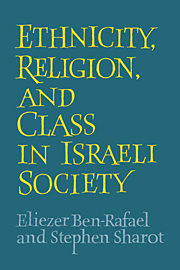Book contents
- Frontmatter
- Contents
- Acknowledgments
- I Theoretical and empirical background
- II Social patterns and behavior
- III Identities and images
- IV The impact of stratification
- 11 Voting
- 12 Discrimination
- 13 Assimilation or ethnic solidarity?
- V Social cleavages: an overview of Israeli society and some theoretical implications
- Appendix A The sample
- Appendix B Deprivation index
- Appendix C Indexes of ethnic identification
- Glossary
- Notes
- References
- Index
13 - Assimilation or ethnic solidarity?
Published online by Cambridge University Press: 12 September 2009
- Frontmatter
- Contents
- Acknowledgments
- I Theoretical and empirical background
- II Social patterns and behavior
- III Identities and images
- IV The impact of stratification
- 11 Voting
- 12 Discrimination
- 13 Assimilation or ethnic solidarity?
- V Social cleavages: an overview of Israeli society and some theoretical implications
- Appendix A The sample
- Appendix B Deprivation index
- Appendix C Indexes of ethnic identification
- Glossary
- Notes
- References
- Index
Summary
The span of theoretical possibilities
In chapter 1 we distinguished three theoretical perspectives that have dealt with the impact of socio-economic stratification on ethnicity: the assimilationist-developmental perspective, the cultural division of labor perspective, and the resource-competition perspective. These approaches imply divergent expectations with respect to the effects of stratification and socio-economic mobility in Israel. The assimilationist-developmental perspective, which emphasizes the relationship of cultural change to socio-economic mobility, would expect the more “modern” Israeli of European origin to exhibit a lower level of ethnicity, and that modernization would progressively eliminate ethnicity among the groups of Middle Eastern origin. From this perspective it might be argued that the comparatively recent immigration of many Israelis would account for the relative strength of ethnic allegiances (if such were found), but would expect the higher socio-economic strata of groups, such as Moroccans and Iraqis, to exhibit weaker ethnic solidarity than the lower strata.
The assimilationist perspective has its parallel in Israel in what has been referred to as the “absorption through modernization” approach of Eisenstadt and some of his students and colleagues (Eisenstadt, 1955; Bar-Yosef, 1968; Ben-David, 1953). The emphasis of this approach was on the absorption of “traditional” immigrants within the social framework of a modernizing society.
- Type
- Chapter
- Information
- Ethnicity, Religion and Class in Israeli Society , pp. 204 - 216Publisher: Cambridge University PressPrint publication year: 1991



